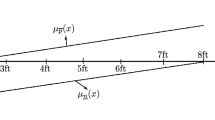Abstract
This paper will study the bipolar fuzzy relation equation based on the max-product composition and the adjoint negation operator obtained from the product residuated implication. Interesting properties and different examples of this bipolar max-product fuzzy relation equation will be introduced.
Partially supported by the State Research Agency (AEI) and the European Regional Development Fund (ERDF) project TIN2016-76653-P, and by the research and transfer program of the University of Cádiz.
Access this chapter
Tax calculation will be finalised at checkout
Purchases are for personal use only
Similar content being viewed by others
References
Bělohlávek, R.: Sup-t-norm and inf-residuum are one type of relational product: Unifying framework and consequences. Fuzzy Sets Syst. 197, 45–58 (2012)
Cornejo, M., Lobo, D., Medina, J.: Bipolar fuzzy relation equations based on product t-norm. In: 2017 IEEE International Conference on Fuzzy Systems. IEEE Press (2017)
Cornejo, M.E., Medina, J., Ramírez-Poussa, E.: A comparative study of adjoint triples. Fuzzy Sets Syst. 211, 1–14 (2013)
Cornejo, M.E., Medina, J., Ramírez-Poussa, E.: Adjoint negations, more than residuated negations. Inf. Sci. 345, 355–371 (2016)
De Baets, B.: Analytical solution methods for fuzzy relation equations. In: Dubois, D., Prade, H. (eds.) The Handbooks of Fuzzy Sets Series, vol. 1, pp. 291–340. Kluwer, Dordrecht (1999)
Di Nola, A., Sanchez, E., Pedrycz, W., Sessa, S.: Fuzzy Relation Equations and Their Applications to Knowledge Engineering. Kluwer Academic Publishers, Norwell, MA, USA (1989)
Díaz, J.C., Medina, J.: Multi-adjoint relation equations: definition, properties and solutions using concept lattices. Inf. Sci. 253, 100–109 (2013)
Díaz-Moreno, J.C., Medina, J., Turunen, E.: Minimal solutions of general fuzzy relation equations on linear carriers. an algebraic characterization. Fuzzy Sets Syst. 311, 112–123 (2017)
Freson, S., Baets, B.D., Meyer, H.D.: Linear optimization with bipolar max-min constraints. Inf. Sci., 234, 3–15 (2013). Fuzzy Relation Equations: New Trends and Applications
Ignjatović, J., Ćirić, M., Šešelja, B., Tepavčević, A.: Fuzzy relational inequalities and equations, fuzzy quasi-orders, closures and openings of fuzzy sets. Fuzzy Sets Syst. 260, 1–24 (2015). Theme: Algebraic Structures
Li, D.-C., Geng, S.-L.: Optimal solution of multi-objective linear programming with inf-\(\rightarrow \) fuzzy relation equations constraint. Inf. Sci. 271, 159–178 (2014)
Li, P., Jin, Q.: On the resolution of bipolar max-min equations. Kybernetika 52(4), 514–530 (2016)
Medina, J.: Minimal solutions of generalized fuzzy relational equations: Clarifications and corrections towards a more flexible setting. Int. J. Approx. Reason. 84, 33–38 (2017)
Medina, J.: Notes on ‘solution sets of inf-\(\alpha _{T}\) fuzzy relational equations on complete brouwerian lattice’ and ‘fuzzy relational equations on complete brouwerian lattices’. Inf. Sci. 402, 82–90 (2017)
Peeva, K.: Imprecision and Uncertainty in Information Representation and Processing: New Tools Based on Intuitionistic Fuzzy Sets and Generalized Nets, pp. 73–85. Springer International Publishing, Cham (2016)
Perfilieva, I., Nosková, L.: System of fuzzy relation equations with inf-\(\rightarrow \) composition: complete set of solutions. Fuzzy Sets Syst. 159(17), 2256–2271 (2008)
Sanchez, E.: Resolution of composite fuzzy relation equations. Inf. Control 30(1), 38–48 (1976)
Sanchez, E.: Inverses of fuzzy relations. application to possibility distributions and medical diagnosis. Fuzzy Sets Syst. 2(1), 75–86 (1979)
Zhou, J., Yu, Y., Liu, Y., Zhang, Y.: Solving nonlinear optimization problems with bipolar fuzzy relational equation constraints. J. Inequal. Appl. 2016(1), 126 (2016)
Author information
Authors and Affiliations
Corresponding author
Editor information
Editors and Affiliations
Rights and permissions
Copyright information
© 2019 Springer Nature Switzerland AG
About this chapter
Cite this chapter
Cornejo, M.E., Lobo, D., Medina, J. (2019). Bipolar Max-Product Fuzzy Relation Equations with the Product Negation. In: Cornejo, M., Kóczy, L., Medina, J., De Barros Ruano, A. (eds) Trends in Mathematics and Computational Intelligence. Studies in Computational Intelligence, vol 796. Springer, Cham. https://doi.org/10.1007/978-3-030-00485-9_17
Download citation
DOI: https://doi.org/10.1007/978-3-030-00485-9_17
Published:
Publisher Name: Springer, Cham
Print ISBN: 978-3-030-00484-2
Online ISBN: 978-3-030-00485-9
eBook Packages: Intelligent Technologies and RoboticsIntelligent Technologies and Robotics (R0)




